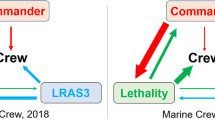Abstract
A multi-level framework for analyzing team cognition based on team communication content and team neurophysiology is described. The semantic content of team communication in submarine training crews is quantified using Latent Semantic Analysis (LSA), and their team neurophysiology is quantified using the previously described neurophysiologic synchrony method. In the current study, we validate the LSA communication metrics by demonstrating their sensitivity to variations in training segment and by showing that less experienced (novice) crews can be differentiated from more experienced crews based on the semantic relatedness of their communications. Cross-correlations between an LSA metric and a team neurophysiology metric are explored to examine fluctuations in the lead-lag relationship between team communication and team neurophysiology as a function of training segment and level of team experience. Finally, the implications of this research for team training and assessment are considered.
Chapter PDF
Similar content being viewed by others
References
Cooke, N.J., Salas, E., Cannon-Bowers, J.A., Stout, R.: Measuring team knowledge. Human Factors 42, 151–173 (2000)
Salas, E., Dickinson, T.L., Converse, S.A., Tannenbaum, S.I.: Toward an understanding of team performance and training. In: Swezey, R.W., Salas, E. (eds.) Teams: Their Training and Performance, pp. 3–29. Ablex, Norwood (1992)
Cannon-Bowers, J.A., Salas, E., Converse, S.: Shared mental models in expert team decision making. In: Castellan, N.J. (ed.) Individual and Group Decision Making, pp. 221–246. Lawrence Erlbaum Associates, Hillsdale (1993)
DeChurch, L.A., Mesmer-Magnus, J.R.: The cognitive underpinnings of effective teamwork: A meta-analysis. Journal of Applied Psychology 95, 32–53 (2010)
Langan-Fox, J., Code, S., Langfield-Smith, K.: Team mental models: Techniques, methods, and analytic approaches. Human Factors 42, 242–271 (2000)
Cooke, N.J., Gorman, J.C., Myers, C.W., Duran, J.L.: Interactive team cognition. Cognitive Science. [Electronic publication ahead of print] (2012)
Stevens, R.H., Gorman, J.C., Amazeen, P., Likens, A., Galloway, T.: The organizational dynamics of teams. Nonlinear Dynamics, Psychology and Life Sciences 17, 67–86 (2013)
Stevens, R., Galloway, T., Wang, P., Berka, C.: Cognitive neurophysiologic synchronies: What can they contribute to the study of teamwork? Human Factors 54, 489–502 (2012)
Cooke, N.J., Gorman, J.C.: Interaction-based measures of cognitive systems. Journal of Cognitive Engineering and Decision Making 3, 27–46 (2009)
Gorman, J.C., Cooke, N.J., Amazeen, P.G., Fouse, S.: Measuring patterns in team interaction sequences using a discrete recurrence approach. Human Factors 54, 503–517 (2012)
Gorman, J.C., Foltz, P.W., Kiekel, P.A., Martin, M.J., Cooke, N.J.: Evaluation of latent-semantic analysis-based measures of team communications. In: Proceedings of the Human Factors and Ergonomics Society 47th Annual Meeting, pp. 424–428 (2003)
Landauer, T.K., Foltz, P.W., Laham, D.: Introduction to Latent Semantic Analysis. Discourse Processes 25, 259–284 (1998)
Landauer, T.K., Dumais, S.T.: A solution to Plato’s problem: The Latent Semantic Analysis theory of the acquisition, induction, and representation of knowledge. Psychological Review 104, 211–240 (1997)
Shapiro, L.A.: Embodied cognition. Routledge, New York (2011)
Author information
Authors and Affiliations
Editor information
Editors and Affiliations
Rights and permissions
Copyright information
© 2013 Springer-Verlag Berlin Heidelberg
About this paper
Cite this paper
Gorman, J.C., Martin, M.J., Dunbar, T.A., Stevens, R.H., Galloway, T. (2013). Analysis of Semantic Content and Its Relation to Team Neurophysiology during Submarine Crew Training. In: Schmorrow, D.D., Fidopiastis, C.M. (eds) Foundations of Augmented Cognition. AC 2013. Lecture Notes in Computer Science(), vol 8027. Springer, Berlin, Heidelberg. https://doi.org/10.1007/978-3-642-39454-6_15
Download citation
DOI: https://doi.org/10.1007/978-3-642-39454-6_15
Publisher Name: Springer, Berlin, Heidelberg
Print ISBN: 978-3-642-39453-9
Online ISBN: 978-3-642-39454-6
eBook Packages: Computer ScienceComputer Science (R0)




